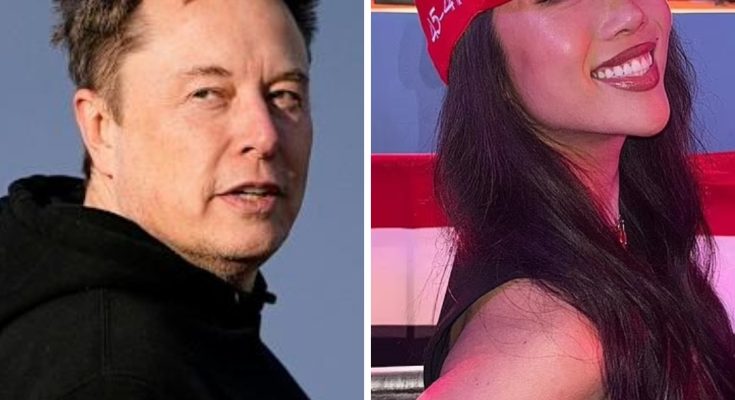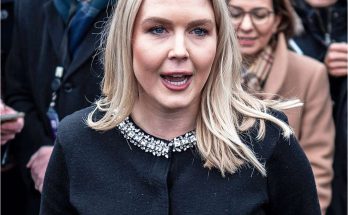In an unfolding saga that is beginning to resemble a real-life blend of futuristic dynasty building and personal entanglement, Elon Musk, the world’s richest man, has now been linked to yet another controversial offer related to his growing collection of children.According to a recent report by The Wall Street Journal, Musk reportedly asked cryptocurrency influencer Tiffany Fong if she would consider having a child with him, despite the two never having met in person. The revelation, shocking in its implications, underscores an increasingly bizarre pattern in Musk’s private life—where the lines between power, influence, social media control, and reproduction are becoming disturbingly blurred.Fong, a well-known voice in the cryptocurrency community with over 335,000 followers on X (formerly Twitter) and a popular YouTube channel with more than 48,000 subscribers, is no stranger to public attention.She rose to prominence through her detailed coverage of the Sam Bankman-Fried scandal and became a go-to source for crypto-related news after conducting high-profile interviews, including with disgraced crypto figures.But even in the turbulent, scandal-prone world of digital finance, being asked by Elon Musk—via direct message—to bear his child stands out as a new kind of surreal.And perhaps most revealing is not just the ask itself, but the context around it. Fong reportedly worried that declining the offer might hurt her revenue stream on Musk’s own social media platform, where she had recently been earning thousands of dollars in payouts tied to post engagement and subscription activity.At the heart of this strange request lies a dangerous power dynamic. Fong had been interacting with Musk online for months. He had liked her posts, replied to her frequently, and even followed her account, boosting her visibility tremendously.According to the Wall Street Journal, Fong earned $21,000 in just two weeks after Musk’s online attention sent her numbers soaring.This is no small detail. X, the platform Musk owns, has launched monetization features that directly reward users for high engagement—features Musk himself oversees. The more views, the more money. The more Musk engages, the more likely a user is to go viral. In Fong’s case, his approval led to a measurable spike in income, visibility, and online clout.Then came the ask.Around November 2024, Musk reportedly sent Fong a direct message asking if she would be willing to have a child with him. The context, tone, and nature of the message are not publicly disclosed, but its implications are difficult to ignore. Here was a tech mogul—who controls the platform she profits from—offering a potential spot in his growing legacy of heirs.Fong, reportedly taken aback, said no. She later confided in conservative influencer Ashley St. Clair and others, explaining that she wanted a “more traditional family”, and feared the consequences of declining the richest man on Earth.Her fears were not unfounded.Shortly after declining Musk’s proposal and confiding in others, Fong’s fortunes on X began to change. Musk unfollowed her, a quiet but public statement of disapproval in the world of social media clout. According to the Wall Street Journal, he also reprimanded her privately for sharing the story with others—even though she had made no public posts at the time.Fong’s monetization on X reportedly dropped significantly following Musk’s withdrawal of support. Engagement slowed. Payouts decreased. The influencer, once thriving under Musk’s algorithmic spotlight, was now cast into shadow.When asked for comment, Fong told The Independent she “did not feed this story” to The Wall Street Journal and would have “rather kept it private.” Her statement suggests that the media attention is not something she sought, but rather something that found her—because of a pattern, because of a billionaire’s behavior, and because of the very nature of power in a digital age.This incident adds yet another thread to the increasingly complex web of Elon Musk’s personal life. The Tesla and SpaceX CEO now has at least 14 children with four known women, spanning traditional relationships, surrogacy, and alleged secret paternity agreements.The most high-profile among these are his children with:- Justine Wilson, his first wife, with whom he had six children (one of whom tragically passed away in infancy).- Grimes, the Canadian musician, with whom he has three children, including the famously named X Æ A-12.- Shivon Zilis, an executive at Neuralink, who has had four children with Musk, including a pair of twins born in close timing with Grimes’s second child.- Ashley St. Clair, a 26-year-old conservative influencer who recently went public with her claims of sharing a child—Romulus St. Clair—with Musk. She also claims Musk offered her a $15 million hush agreement, which she refused.The pattern, dubbed by many online as “Musk’s harem”, is no longer a fringe conspiracy. It’s an ongoing, documented series of relationships, financial arrangements, paternity disputes, and reproductive proposals. What’s more, Musk doesn’t deny it. He has repeatedly voiced his concerns about “the decline of global birthrates”, and has often cited the need to procreate as a moral responsibility—particularly for high-IQ individuals, tech leaders, and visionaries.His long-term vision of a multiplanetary species, rooted in SpaceX’s Mars colonization goals, seems increasingly interwoven with a real-world strategy to populate Earth with as many Musk children as possible.But the question remains: Is this consent, or is it curation?Fong’s hesitation wasn’t just about motherhood. It was about power.When one of the wealthiest and most influential men in the world—who owns the very platform you make a living from—asks you to carry his child, can you really say “no” without consequences?Fong’s story reveals the subtle but real fear of financial retaliation. The drop in her revenue after Musk unfollowed her isn’t proof of sabotage, but it’s certainly evidence of influence. Musk’s ability to elevate or diminish voices on X—whether intentionally or incidentally—is absolute.And that raises serious concerns about coercion, ethics, and exploitation in a digital economy.If turning down a private reproductive request can lead to a public loss of income, what does that say about freedom on platforms run by powerful individuals? What does it mean for influencers, creators, journalists, and women who depend on those platforms for income?What started as a private proposal has evolved into a broader conversation about how power is wielded in the modern era—not just politically or economically, but biologically and socially.Elon Musk isn’t just building rockets, cars, and AI. He’s building a genetic legacy, and doing so in a way that many critics now call deeply troubling. The influence he exerts over his partners—whether financial, ideological, or algorithmic—raises pressing ethical questions.Are these women empowered or enlisted? Are they partners in a vision, or pawns in a narrative? Do they see Musk as a father figure or as a god-king of reproduction? Most importantly: do they really have a choice?Fong’s story says a lot about the blurred boundaries between consent and career. When a “no” comes at the cost of your income, it isn’t just a personal decision—it’s a professional risk.Fong has expressed her wish to move past the ordeal, but the genie is out of the bottle. This story, whether she wanted it told or not, now belongs to the public.It joins a growing list of stories that collectively paint a picture of Musk not just as a business mogul—but as a new kind of patriarch, one whose legacy is being written not just in rockets and robots, but in real children, real women, and real consequences.Whether that legacy is one of brilliance or abuse of power will depend on how stories like Fong’s—and St. Clair’s—are understood, remembered, and acted upon.
Exclusive: Elon Musk’s baby proposal to Tiffany Fong fuels latest twist in billionaire’s paternity saga



